六年级英语笔记
- 格式:doc
- 大小:130.50 KB
- 文档页数:15
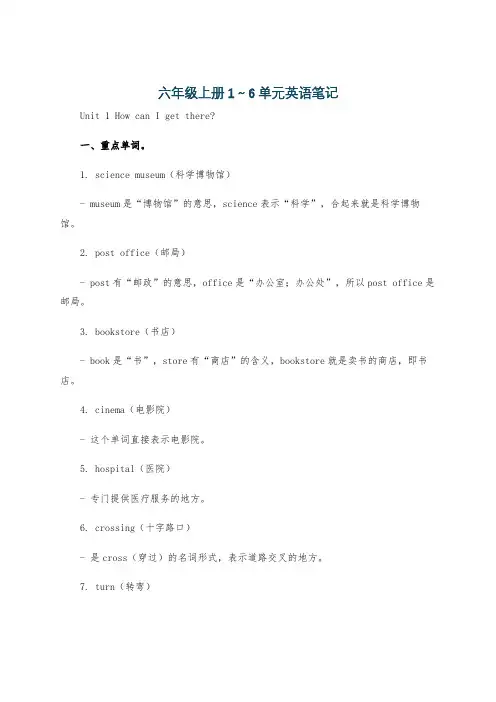
六年级上册1~6单元英语笔记Unit 1 How can I get there?一、重点单词。
1. science museum(科学博物馆)- museum是“博物馆”的意思,science表示“科学”,合起来就是科学博物馆。
2. post office(邮局)- post有“邮政”的意思,office是“办公室;办公处”,所以post office是邮局。
3. bookstore(书店)- book是“书”,store有“商店”的含义,bookstore就是卖书的商店,即书店。
4. cinema(电影院)- 这个单词直接表示电影院。
5. hospital(医院)- 专门提供医疗服务的地方。
6. crossing(十字路口)- 是cross(穿过)的名词形式,表示道路交叉的地方。
7. turn(转弯)- 既可以作动词,如turn left(向左转),turn right(向右转);也可以作名词。
二、重点短语。
1. near(在……附近)- 例如:The post office is near the bookstore.(邮局在书店附近。
)2. next to(紧挨着;与……相邻)- My home is next to the cinema.(我的家紧挨着电影院。
)3. in front of(在……前面)- There is a tree in front of my house.(我家前面有一棵树。
注意:in front of是在物体外部的前面,而in the front of是在物体内部的前面,如There is a blackboard in the front of the classroom.教室里前面有一块黑板。
)4. behind(在……后面)- The cat is behind the box.(猫在盒子后面。
)5. go straight(直走)- Go straight and you can see the hospital.(直走你就能看到医院。
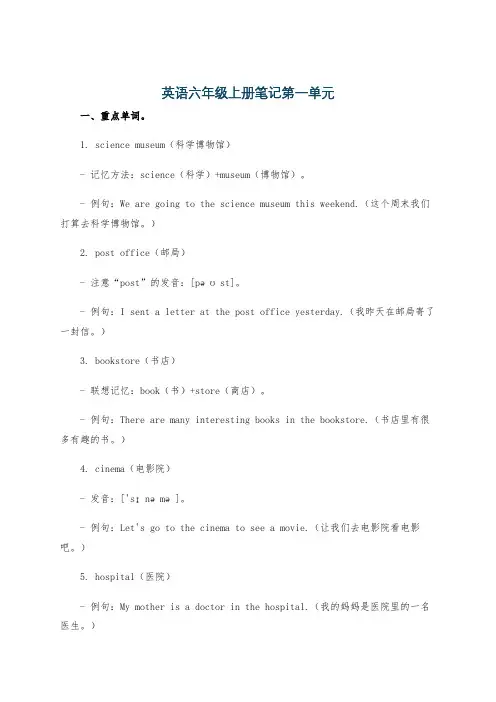
英语六年级上册笔记第一单元一、重点单词。
1. science museum(科学博物馆)- 记忆方法:science(科学)+museum(博物馆)。
- 例句:We are going to the science museum this weekend.(这个周末我们打算去科学博物馆。
)2. post office(邮局)- 注意“post”的发音:[pəʊst]。
- 例句:I sent a letter at the post office yesterday.(我昨天在邮局寄了一封信。
)3. bookstore(书店)- 联想记忆:book(书)+store(商店)。
- 例句:There are many interesting books in the bookstore.(书店里有很多有趣的书。
)4. cinema(电影院)- 发音:['sɪnəmə]。
- 例句:Let's go to the cinema to see a movie.(让我们去电影院看电影吧。
)5. hospital(医院)- 例句:My mother is a doctor in the hospital.(我的妈妈是医院里的一名医生。
)6. crossing(十字路口)- 例句:Turn right at the second crossing.(在第二个十字路口右转。
)7. turn(转弯;转变)- 常见搭配:turn left(向左转),turn right(向右转)。
- 例句:You should turn left at the post office.(你应该在邮局处左转。
)8. straight(笔直地)- 例句:Go straight and you will see the park.(直走你就会看到公园。
)二、重点短语。
1. near the park(在公园附近)- 例句:My home is near the park.(我的家在公园附近。
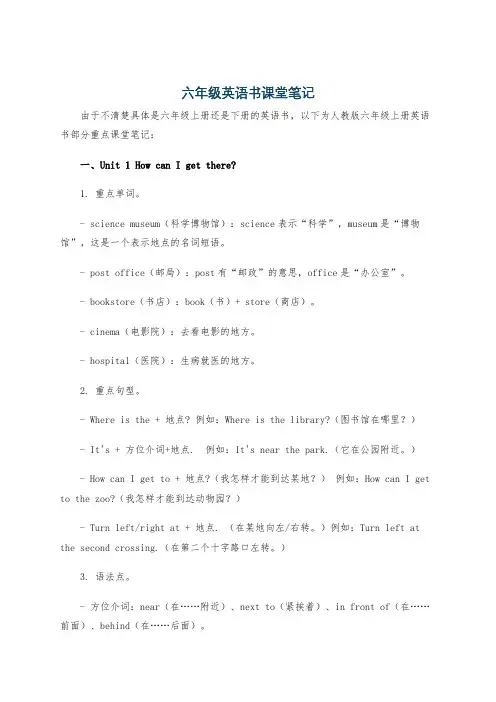
六年级英语书课堂笔记由于不清楚具体是六年级上册还是下册的英语书,以下为人教版六年级上册英语书部分重点课堂笔记:一、Unit 1 How can I get there?1. 重点单词。
- science museum(科学博物馆):science表示“科学”,museum是“博物馆”,这是一个表示地点的名词短语。
- post office(邮局):post有“邮政”的意思,office是“办公室”。
- bookstore(书店):book(书)+ store(商店)。
- cinema(电影院):去看电影的地方。
- hospital(医院):生病就医的地方。
2. 重点句型。
- Where is the + 地点? 例如:Where is the library?(图书馆在哪里?)- It's + 方位介词+地点. 例如:It's near the park.(它在公园附近。
)- How can I get to + 地点?(我怎样才能到达某地?)例如:How can I get to the zoo?(我怎样才能到达动物园?)- Turn left/right at + 地点. (在某地向左/右转。
)例如:Turn left at the second crossing.(在第二个十字路口左转。
)3. 语法点。
- 方位介词:near(在……附近)、next to(紧挨着)、in front of(在……前面)、behind(在……后面)。
二、Unit 2 Ways to go to school。
1. 重点单词。
- by bike(骑自行车):表示出行方式,by + 交通工具,交通工具要用单数形式,且中间没有冠词。
类似的还有by bus(乘公共汽车)、by subway(乘地铁)等。
- on foot(步行):这是一个固定短语。
- slow(慢的):形容词,其反义词是fast(快的)。
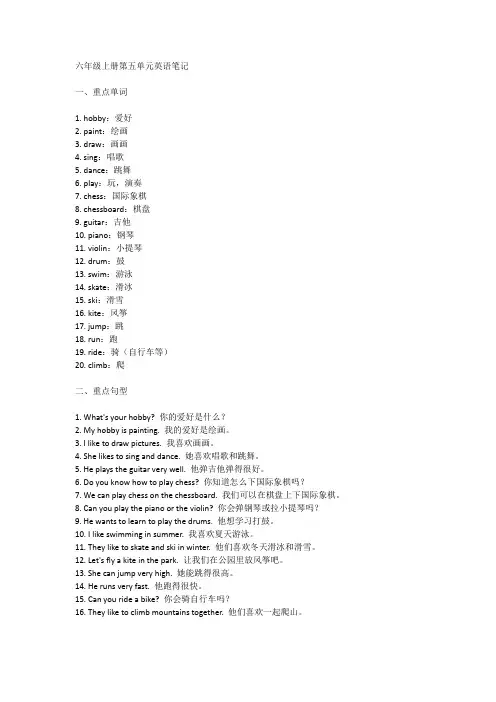
六年级上册第五单元英语笔记一、重点单词1. hobby:爱好2. paint:绘画3. draw:画画4. sing:唱歌5. dance:跳舞6. play:玩,演奏7. chess:国际象棋8. chessboard:棋盘9. guitar:吉他10. piano:钢琴11. violin:小提琴12. drum:鼓13. swim:游泳14. skate:滑冰15. ski:滑雪16. kite:风筝17. jump:跳18. run:跑19. ride:骑(自行车等)20. climb:爬二、重点句型1. What's your hobby? 你的爱好是什么?2. My hobby is painting. 我的爱好是绘画。
3. I like to draw pictures. 我喜欢画画。
4. She likes to sing and dance. 她喜欢唱歌和跳舞。
5. He plays the guitar very well. 他弹吉他弹得很好。
6. Do you know how to play chess? 你知道怎么下国际象棋吗?7. We can play chess on the chessboard. 我们可以在棋盘上下国际象棋。
8. Can you play the piano or the violin? 你会弹钢琴或拉小提琴吗?9. He wants to learn to play the drums. 他想学习打鼓。
10. I like swimming in summer. 我喜欢夏天游泳。
11. They like to skate and ski in winter. 他们喜欢冬天滑冰和滑雪。
12. Let's fly a kite in the park. 让我们在公园里放风筝吧。
13. She can jump very high. 她能跳得很高。
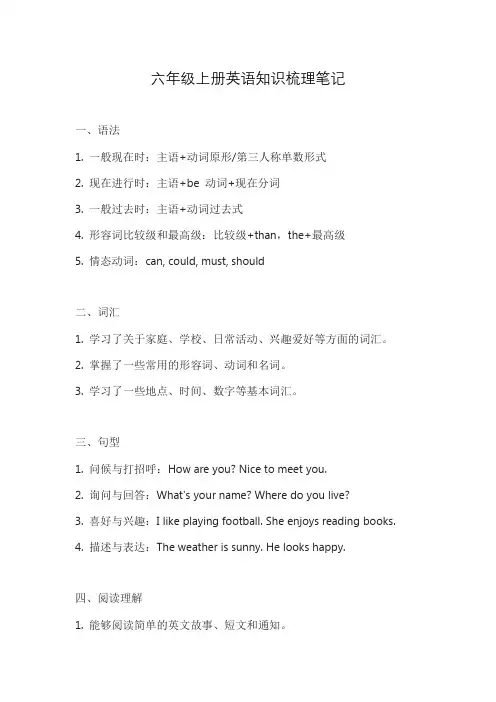
六年级上册英语知识梳理笔记
一、语法
1. 一般现在时:主语+动词原形/第三人称单数形式
2. 现在进行时:主语+be 动词+现在分词
3. 一般过去时:主语+动词过去式
4. 形容词比较级和最高级:比较级+than,the+最高级
5. 情态动词:can, could, must, should
二、词汇
1. 学习了关于家庭、学校、日常活动、兴趣爱好等方面的词汇。
2. 掌握了一些常用的形容词、动词和名词。
3. 学习了一些地点、时间、数字等基本词汇。
三、句型
1. 问候与打招呼:How are you? Nice to meet you.
2. 询问与回答:What's your name? Where do you live?
3. 喜好与兴趣:I like playing football. She enjoys reading books.
4. 描述与表达:The weather is sunny. He looks happy.
四、阅读理解
1. 能够阅读简单的英文故事、短文和通知。
2. 理解主要内容和细节。
3. 回答关于阅读材料的问题。
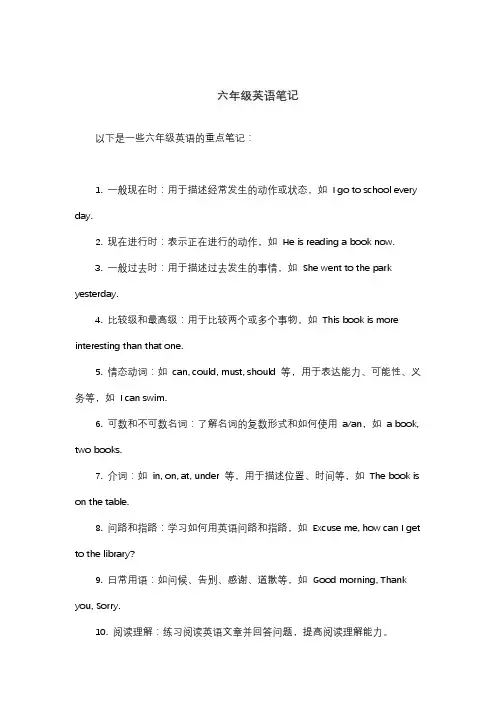
六年级英语笔记
以下是一些六年级英语的重点笔记:
1. 一般现在时:用于描述经常发生的动作或状态,如 I go to school every day.
2. 现在进行时:表示正在进行的动作,如 He is reading a book now.
3. 一般过去时:用于描述过去发生的事情,如 She went to the park yesterday.
4. 比较级和最高级:用于比较两个或多个事物,如 This book is more interesting than that one.
5. 情态动词:如 can, could, must, should 等,用于表达能力、可能性、义务等,如 I can swim.
6. 可数和不可数名词:了解名词的复数形式和如何使用 a/an,如 a book, two books.
7. 介词:如 in, on, at, under 等,用于描述位置、时间等,如 The book is on the table.
8. 问路和指路:学习如何用英语问路和指路,如 Excuse me, how can I get to the library?
9. 日常用语:如问候、告别、感谢、道歉等,如 Good morning, Thank you, Sorry.
10. 阅读理解:练习阅读英语文章并回答问题,提高阅读理解能力。
这些只是六年级英语的一些重点笔记,具体内容可能因教材和教学要求而有所不同。
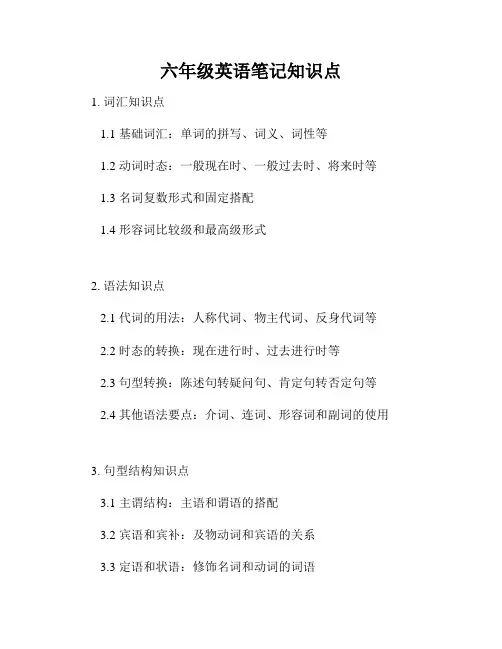
六年级英语笔记知识点
1. 词汇知识点
1.1 基础词汇:单词的拼写、词义、词性等
1.2 动词时态:一般现在时、一般过去时、将来时等 1.3 名词复数形式和固定搭配
1.4 形容词比较级和最高级形式
2. 语法知识点
2.1 代词的用法:人称代词、物主代词、反身代词等 2.2 时态的转换:现在进行时、过去进行时等
2.3 句型转换:陈述句转疑问句、肯定句转否定句等 2.4 其他语法要点:介词、连词、形容词和副词的使用
3. 句型结构知识点
3.1 主谓结构:主语和谓语的搭配
3.2 宾语和宾补:及物动词和宾语的关系
3.3 定语和状语:修饰名词和动词的词语
3.4 状语从句和定语从句:引导词和从句的语序
4. 阅读技巧和理解
4.1 阅读速度与准确性的平衡
4.2 找出关键词和主题句
4.3 掌握不同类型文章的结构和特点
4.4 分析文章中的信息和细节
5. 写作技巧
5.1 写作结构:开头、中间段落和结尾的组织 5.2 使用适当的过渡词和连接词
5.3 表达清晰的观点和理由
5.4 检查和修正语法和拼写错误
6. 口语表达
6.1 学习正确的发音和语调
6.2 练习日常对话和演讲技巧
6.3 提高听力理解和对话回应能力
6.4 学习常用口语短语和惯用表达方式
以上是六年级英语笔记的主要知识点,通过学习和掌握这些内容,可以帮助你在英语学习中取得更好的成绩。
记得多加练习和阅读,不断提升自己的语言能力。
祝你学习愉快!。
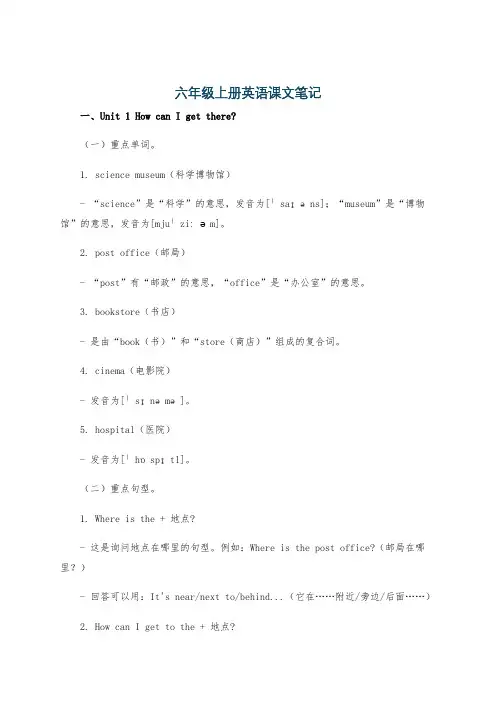
六年级上册英语课文笔记一、Unit 1 How can I get there?(一)重点单词。
1. science museum(科学博物馆)- “science”是“科学”的意思,发音为[ˈsaɪəns];“museum”是“博物馆”的意思,发音为[mjuˈziːəm]。
2. post office(邮局)- “post”有“邮政”的意思,“office”是“办公室”的意思。
3. bookstore(书店)- 是由“book(书)”和“store(商店)”组成的复合词。
4. cinema(电影院)- 发音为[ˈsɪnəmə]。
5. hospital(医院)- 发音为[ˈhɒspɪtl]。
(二)重点句型。
1. Where is the + 地点?- 这是询问地点在哪里的句型。
例如:Where is the post office?(邮局在哪里?)- 回答可以用:It's near/next to/behind...(它在……附近/旁边/后面……)2. How can I get to the + 地点?- 这是询问如何到达某地的句型。
例如:How can I get to the science museum?(我怎样才能到达科学博物馆?)- 回答可以是:You can go by bus/on foot/by bike...(你可以乘公共汽车/步行/骑自行车……)(三)课文中的语法点。
1. 方位介词。
- near(在……附近):表示距离较近,例如:The bookstore is near the school.(书店在学校附近。
)- next to(紧挨着):距离更近,有相邻的关系,如:The post office is next to the cinema.(邮局紧挨着电影院。
)- behind(在……后面):表示在物体的后方,例如:The hospital is behind the park.(医院在公园后面。
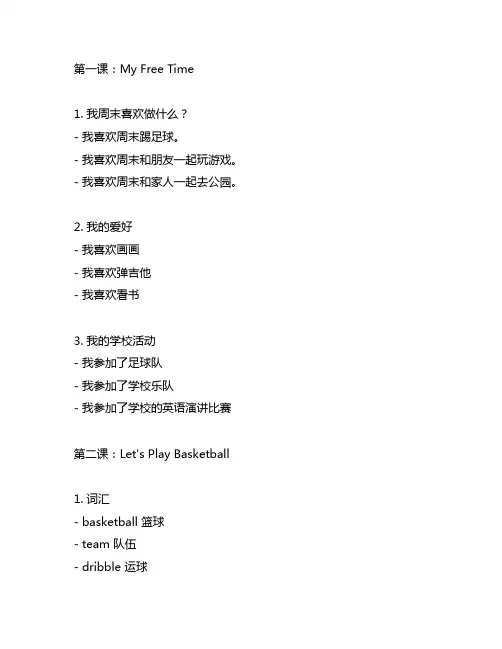
第一课:My Free Time1. 我周末喜欢做什么?- 我喜欢周末踢足球。
- 我喜欢周末和朋友一起玩游戏。
- 我喜欢周末和家人一起去公园。
2. 我的爱好- 我喜欢画画- 我喜欢弹吉他- 我喜欢看书3. 我的学校活动- 我参加了足球队- 我参加了学校乐队- 我参加了学校的英语演讲比赛第二课:Let's Play Basketball1. 词汇- basketball 篮球- team 队伍- dribble 运球- shoot 投篮- rebound 篮板球2. 动词短语- play basketball 打篮球- practice dribbling 练习运球- shoot hoops 投篮- pass the ball 传球3. 句型- We play basketball every Sunday. 每个星期天我们打篮球。
- My brother and I always practice dribbling together. 我和我哥哥总是一起练习运球。
- Can you shoot hoops? 你会投篮吗?第三课:Weekend Activities1. 我的周末活动- 星期六早上,我和家人一起去逛公园。
- 星期六下午,我会去上足球课。
- 星期天早上,我和朋友们会一起打篮球。
- 星期天下午,我会在家看书学习。
2. 我的外公外婆的周末活动- 我的外公外婆喜欢去晨练。
- 他们还会一起去公园散步。
- 在家的时候,他们会一起做饭。
3. 我的家庭周末活动- 我和家人会一起做家务。
- 我们也会一起去超市购物。
- 有时候,我们会一起去看电影或者去游乐园。
第四课:My Favorite Sport1. 我最喜欢的运动- 我最喜欢踢足球。
- 我觉得踢足球很有趣。
- 我也喜欢看足球比赛。
2. 我的家庭成员喜欢的运动- 我爸爸最喜欢打篮球。
- 我妈妈最喜欢慢跑。
- 我的妹妹最喜欢跳绳。
3. 我的朋友喜欢的运动- 我的朋友小明最喜欢游泳。
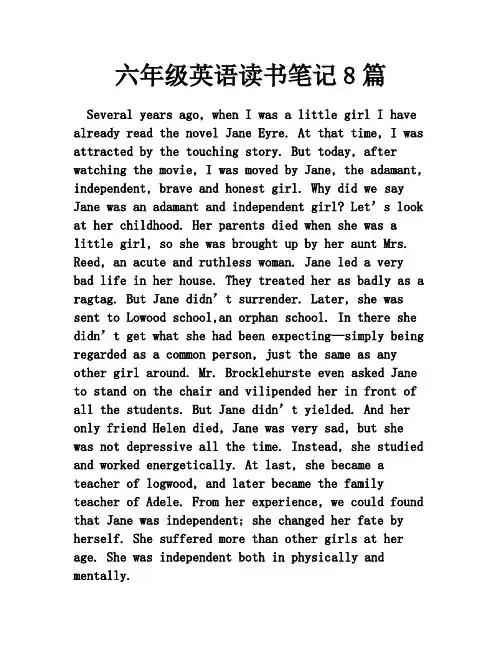
六年级英语读书笔记8篇Several years ago, when I was a little girl I have already read the novel Jane Eyre. At that time, I was attracted by the touching story. But today, after watching the movie, I was moved by Jane, the adamant, independent, brave and honest girl. Why did we say Jane was an adamant and independent girl? Let’s look at her childhood. Her parents died when she was a little girl, so she was brought up by her aunt Mrs. Reed, an acute and ruthless woman. Jane led a very bad life in her house. They treated her as badly as a ragtag. But Jane didn’t surrender. Later, she was sent to Lowood school,an orphan school. In there she didn’t get what she had been expecting--simply being regarded as a common person, just the same as any other girl around. Mr. Brocklehurste even asked Jane to stand on the chair and vilipended her in front of all the students. But Jane didn’t yielded. And her only friend Helen died, Jane was very sad, but she was not depressive all the time. Instead, she studied and worked energetically. At last, she became a teacher of logwood, and later became the family teacher of Adele. From her experience, we could found that Jane was independent; she changed her fate by herself. She suffered more than other girls at her age. She was independent both in physically and mentally.Jane was brave. She dared to say no to Mr. Brocklehurst, cut her beautiful hair with Helen, and pull the horse for Mr. Rochester. What’s more, she dared to accepted Mr. Rochester’s love and pursuit of her own happy life. Though she sa id:“ Do youthink because I am poor, obscure, and little. I am soulless and heartless? You think wrong!-I have as much soul as you--and full as much heart! And if God had gifted me with some beauty and much wealth, I should have made it was hard for you to leave me, as it is not for me to leave you. I am not talking to you now through the medium of custom, conventionalities, nor even of mortal flesh; it is my spirit that addresses your spirit; just as it both had passed through the grave, and we stood at Go d’s feet,. In her opinion, everyone is the same at the God’s feet. God hadn’t given her beauty and wealth, but instead, God gave her a kind mind and a thinking brain. These words expressed complete1y Jane ’s rebellious spirit.She told him her own feeling, and emphasized that they were equal.As we know, there was strict distinguish insocial stratum at that time. Mr. Rochester was in the high society, but Jane was only a family teacher. They were in quite different social stratums. What’s worse, in that society,people’s sense of love was on thebasis of money.For the sake of money they could marry anyone even though the husband or the wife was an idiot on their eyes,money was everything,money was marriage. But unfortunately Jane was very poor. That’s to say,Jane should receive much rumor from society. In fact, she didn’t afraid of it. On the contrary, she accepted with no hesitation. When she knewRochester’s wife was dead and he was blind, she went to look after Rochester determinedly. She didn’tcare about anything else. And I still remember at the party, all the people from the high society laughedat Jane, they looked down upon Jane. She kept silent though her heart was very exciting. And to their surprise, Miss Ingrain was proved to be a loser, Jane defeated her though Jane had no property and beauty.Jane’ s plainness, poverty, position and disposition were contrasted to Ingrainobviously.Jane drove away those aristocrats from competitive stage.High position and great wealth showed by noble class was put aside.Jane gotglorious victory.Jane was self-respected and self-love. When she knew Rochester had a mad wife and she was still alive. Jane left. She couldn’t bare an incomplete love. She left her lover Rochester with contradiction and pain. Though she still loved him very much. She chose another road, which was endless. She was kind andstrict to the moral concept. She couldn’t accept herself do something against the morality. She wasself-respect.To sum up, Jane was a charming girl .What she attracted us was not the beautiful face, lovely figure, and sweet voice .But her brave heart,intelligent brain and adamant character. So wedidn’t surprise that Mr. Rochester chose Jane as his bride instead of Miss Ingrain. Because Jane was much mature and richer in soul. As a girl, I should learn from Jane. Especially in the materialistic society we should be in charge of our own fate. Don’t depend on others all the time. We should be independent .Don’t lead a luxurious life and in hope of marring a rich man, thinking that your husband would change your fate, your social position. That’s silly. We should realize that only depend on your own struggle thenyou could really charge your fate. What’s more, we need to be self-respect and self-love. As far as I am concerned, as a girl if you don’t respect and love yourself, so how do you require others to respect you? In short, we need to learn from Jane Eyre.英语读书笔记篇2He little imagined how my heart warmed towardshim when I beheld his black eyes withdraw so suspiciously under their brows, as I rode up, andwhen his fingers sheltered themselves, with a jealousresolution, still further in his waistcoat, as I announced my name.We crept through a broken hedge, groped our wayup the path, and planted ourselves on a flower-plot under the drawing-room window.It was beautiful - a splendid place carpeted with crimson, and crimson-covered chairs and tables, and a pure white ceiling bordered by gold, a shower ofglass-drops hanging in silver chains from the centre, and shimmering with little soft tapers. Isabella sheis eleven, a year younger than Cathy - lay screamingat the farther end of the room, shrieking as ifwitches were running red-hot needles into her.Thelong light hair curled slightly on the temples; the eyes were large and serious; the figure almost too graceful.She, supposing Edgar could not see her, snatched the cloth from my hand, and pinched me, with a prolonged wrench, very spitef/wenzi/ully on the arm.Her eyes began to glisten and her lids to twinkle.Her lips were half asunder, as if she meant to speak, and she drew a breath; but it escaped in asigh instead of a sentence.My love for Linton is like the foliage in the woods: time will change it, I’m well aware, aswinter changes the trees. My love for Heathcliffresembles the eternal rocks beneath: a source oflittle visible delight, but necessary.There was a violent wind, as well as thunder, and either one or the other split a tree off at the corner of the building: a huge bough fell across the roof, and knocked down a portion of the east chimney-stack, sending a clatter of stones and soot into the kitchen-fire.And her teeth chattered as she shrank closer to the almost extinguished embers.It had got dusk, and the moon looked over the high wall of the court, causing undefined shadows to lurk in the corners of the numerous projecting portions of the building.A ray fell on his features; the cheeks were sallow, and half covered with black whiskers; the brows lowering, the eyes deep-set and singular.英语读书笔记篇3Many people simply regard Pride and Prejudice as a love story, but in my opinion, this book is an illustration of the society at that time. She perfectly reflected the relation between money and marriage at her time and gave the people in her works vivid characters. The characters have their own personalities. Mrs. Bennet is a woman who makes great efforts to marry off her daughters. Mr. Bingley is afriendly young man, but his friend, Mr. Darcy, is a very proud man who seems to always feel superior. Even the five daughters in Bennet family are very different. Jane is simple, innocent and never speaks evil of others.Elizabeth is a clever girl who always has her own opinion. Mary likes reading classic books. (Actually she is a pedant.) Kitty doesn’t have her own opinion but likes to follow her sister, Lydia. Lydia is agirl who follows exotic things, handsome man, and is somehow a little profligate. When I read the book, I can always find the same personalities in the society now. That is why I think this book is indeed the representative of the society in Britain in the 18th century.The family of gentleman in the countryside is Jane Austen’s favourite topic. But this little topic can reflect big problems. It concludes the stratum situation and economic relationships in Britain in her century. You can find these from the very beginning of this book.The first sentence in this book is impressive. It reads: “It is a truth well known to all the world that an unmarried man in possession of a largefortune must be in need of a wife”. The undertone is very clear: the foundation of the marriage at that time is not emotion but possession.People always think that Austen was an expert at telling love stories. In fact, the marriage in her book is not the result of love, but the result of economic needs. After reading this book, I know the truth is that a poor woman must be in need of a husband, a wealthy man.I couldn’t forget how eager Mrs. Bennet wants to marry off her daughters. If you want to know why she is so crazy about these things, I must mention the situation in Britain at that time. Only the eldest son had the privilege of inheriting his father’s possessions. Younger sons and daughters who are used to luxurious lives have no choice but marry a man or woman in possession of a large fortune to continue their comfortable lives. Thus, we can see thatgetting married is a way to become wealthier, particularly for women without many possessions. Jane Austen told us that money and possession determined everything, including marriage and love in her century.In “Pride and Prejudice”, the sister of Mr. Bingley strongly opposed his plan of marrying Jane because the Bennets don’t have many possessions and their social positions are much lower than them. From this, we can see there are a lot of obstacles for a not very rich woman to marry a wealthy husband. The society, the relatives would not allow them to get married.In modern society, although the marriages of economic needs have decreased rapidly, the concept of “money determines everything” is still rooted in some people’s mind. A lot of parents tr y hard to interfere their children’s marriages. Education background, possessions, jobs remains the main reason that may influence one’s marriage. Marry for moneyis still a big problem in our society. We can’t help thinking: can money determine everything?Austen left this problem for us to think. The genius of Jane Austen lies in this perfect simplicity, the simplicity that reflects big problems. Although Austen was only 21 when she wrote “Pride and Prejudice”, her sharp observation of social lives makes the style of this book surprisingly mature and lively. The plots in her works are always very natural. The development of the plot is as inevitable as a problem in mathematics. I think the depth ofPride and Prejudice is the reason that makes thisbook prominent and classic. Today, her book still can be the guide telling us the economic relationshipsboth at her time and in modern time.英语读书笔记篇4Maybe you have seen the novel before -The Little Prince, or not. Tonight, I’m so happy to share with you about my feeling after I have seen it. Actually,I’m deeply attracted, touched by the protagonist of the story: the pure & innocent little prince.After leaving his home planet and his beloved rose, the little prince journeys around the universe, ending up on earth. Before the prince lands on earth, the prince hops from one neighbouring planet to another. On each planet, the prince meets a different type of adult and reveals frivolities andweakness.(other than the fifth figure ,I think ,it seems the l amplighter’s selfless devotion to his orders earns him the little prince’sadmiration.)Once on earth, however, the little prince becomes a student as well as a teacher .From his friend “the fox”, the little prince learns three important lessons: Only the heart can see correctly; The prince’s time away from his planet has made him appreciate his rose more; Love entails-responsibility . And in turn, he passed on those lessons to the narrators before.At last, there is a screen depict the novel.It’s when t he railway switchman works for enormous trains that rush back and forth. Everybody has an experience of a journey, but the rushed voyages never result in happiness because as the switchman informs the princes, people are never happy where they are. Also the train trains rush at each other from opposite direction, suggesting the efforts grown-ups make are contradictory and purposeless. As for thechildren, they see that the journey is more important than the destination and press their faces the window on their journey, taking in the scenery. So sometimes the efforts we did make our lot better is futile.Two funny picture, let’s your imagination wander in your mind, and share with me your thought, thank you.英语读书笔记篇5"The Little Prince" is a clear book, as clear as the water. It’s writes for adults, teenagers and children. It is a book about life and the lives of the fable. As the book said, the water on the heartis beneficial. And "Little Prince" can make people feel warm and fresh.The story is about a boy. He lives on a small planet. He is the only person of the planet. He is a lonely prince. Fortunately, a beautiful rose came in his life. They loved each other. But a little argument separated them. He left the planet which he lives, starts traveling. He went to many planets and met many different people. He likes to watch the sunset when he was sad. He found that people wanted happiness, but always pushed away happiness rudely.At last, he understood how to love each other. Love and life is a veryimportant thing. He is very regret. He wanted to return to the planet which helives. But he didn’t know the road. He chose to drank snake venom end his life because he thought it will be able to cast off his bulky body to go back.Every time, when I read "The Little Prince", I always moved about it. In real life, we often busy in the whole day, such as a fly without soul. The passage of time, childhood away, we grew up and took away a lot of memories, but we also have an oasis in the heart.Bec ause ‘The Little Prince’ story, we live in quiet, the heart has a hope and love, have touched on the responsibility of the life.。
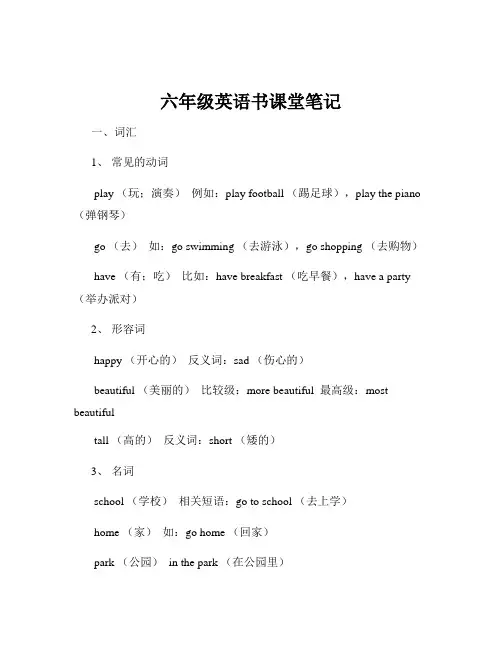
六年级英语书课堂笔记一、词汇1、常见的动词play (玩;演奏)例如:play football (踢足球),play the piano (弹钢琴)go (去)如:go swimming (去游泳),go shopping (去购物) have (有;吃)比如:have breakfast (吃早餐),have a party (举办派对)2、形容词happy (开心的)反义词:sad (伤心的)beautiful (美丽的)比较级:more beautiful 最高级:most beautifultall (高的)反义词:short (矮的)3、名词school (学校)相关短语:go to school (去上学)home (家)如:go home (回家)park (公园) in the park (在公园里)二、语法1、一般现在时表示经常发生的动作或存在的状态。
当主语是第三人称单数时,动词要用第三人称单数形式。
例如:He likes reading books (他喜欢读书。
)注意:第三人称单数形式的变化规则,如:一般在词尾加 s;以 s, x, ch, sh, o 结尾的加 es;以“辅音字母+y”结尾的,变 y 为 i 再加 es。
2、现在进行时表示正在进行的动作。
构成:be 动词(am/is/are)+动词的现在分词。
例如:I'm reading a book (我正在读书。
)动词现在分词的构成规则:一般在词尾加 ing;以不发音的 e 结尾的,去 e 加 ing;重读闭音节结尾的,双写末尾字母再加 ing。
三、句型1、询问爱好What's your hobby? (你的爱好是什么?)I like +动词 ing 形式(我喜欢)2、询问职业What do you do? (你是做什么的?)I'm a/an +职业名称(我是一名)3、询问地点Where is the +地点名词?(在哪里?)It's +表示地点的介词短语(它在)四、日常用语1、 Good morning/afternoon/evening (早上/下午/晚上好。
六年级英语知识点上册笔记Unit 1: Greetings 问候语1. 问候语的基本表达:- Good morning! 早上好!- Good afternoon! 下午好!- Good evening! 晚上好!- Goodbye! 再见!2. 自我介绍:- My name is [name]. 我叫[name]。
- I am [age] years old. 我[age]岁了。
- I am from [place]. 我来自[地方]。
- Nice to meet you. 很高兴见到你。
Unit 2: Family 家人1. 家庭成员的称呼:- father 父亲- mother 母亲- brother 兄弟- sister 姐妹- grandfather 祖父- grandmother 祖母2. 表示家人关系的句子:- This is my father. 这是我的爸爸。
- She is my sister. 她是我的姐姐。
- His grandmother is very kind. 他的祖母人很好。
Unit 3: School Life 学校生活1. 学科名称:- Chinese 语文- Math 数学- English 英语- Science 科学- History 历史2. 表示学习活动的句子:- I study Chinese every day. 我每天学习语文。
- We have math class in the morning. 我们上午有数学课。
- Our English teacher is very friendly. 我们的英语老师很友好。
Unit 4: Daily Routines 日常生活1. 时间表达方法:- in the morning 早上- in the afternoon 下午- in the evening 晚上- at night 在晚上2. 描述日常活动的句子:- I get up at 7 o'clock in the morning. 我早上7点起床。
英语六年级课堂笔记六年级英语(人教版)课堂笔记。
一、单词部分。
1. 重点单词。
- 形容词。
- big(大的):其比较级是bigger,最高级是biggest。
例如:The elephant is a big animal.(大象是一种大型动物。
)- small(小的):比较级为smaller,最高级是smallest。
如:This cat is small.(这只猫很小。
)- 名词。
- book(书):复数形式是books。
I have many books.(我有很多书。
)- pen(钢笔):复数pens。
My pen is blue.(我的钢笔是蓝色的。
)- 动词。
- go(去):过去式went。
He went to school yesterday.(他昨天去上学了。
)- come(来):过去式came。
She came home late.(她回家晚了。
)2. 词汇记忆方法。
- 联想法:例如记忆“pest(害虫)”这个单词,可以联想成“拍死它(pest)”,这样就容易记住了。
- 词根词缀法:像“un - ”这个前缀表示否定,“happy(高兴的)”加上“un - ”变成“unhappy(不高兴的)”。
二、语法部分。
1. 一般现在时。
- 概念:表示经常或习惯性的动作或状态。
- 结构。
- 主语是第一、二人称单复数和第三人称复数时:动词用原形。
例如:I like apples.(我喜欢苹果。
)You play football every day.(你们每天踢足球。
)They go to school on foot.(他们步行去上学。
)- 主语是第三人称单数(he/she/it等)时:动词要加 - s或 - es。
如:He likes reading books.(他喜欢读书。
)She goes to work by bike.(她骑自行车去上班。
)- 时间标志词:often(经常),usually(通常),sometimes(有时),every day(每天)等。
六年级英语第二单元知识点笔记一、重点单词。
1. on foot.- 意思:步行。
例如:I go to school on foot.(我步行去上学。
)2. by.- 表示交通方式,“乘……;骑……”。
- 如:by bike(骑自行车),by bus(乘公共汽车),by train(乘火车),by plane(乘飞机)等。
- 注意:“by + 交通工具”时,交通工具用单数形式,且前面不加冠词。
3. subway.- 意思:地铁。
英式英语是“underground”或者“tube”,美式英语常用“subway”。
例如:I take the subway to work.(我乘地铁去上班。
)4. ship.- 意思:船;舰。
例如:They go to the island by ship.(他们乘船去那个岛。
)5. taxi.- 意思:出租汽车。
例如:He takes a taxi to the airport.(他乘出租车去机场。
)6. slow.- 形容词,意思:慢的;缓慢的。
例如:The turtle is slow.(乌龟很慢。
)其反义词是“fast”(快的)。
7. down.- 副词,意思:减少;降低;向下。
例如:Sit down, please.(请坐下。
)也可用于短语“slow down”(慢下来)。
8. stop.- 动词,意思:停止。
例如:The car stops at the red light.(汽车在红灯处停下来。
)也可作名词,意思是“车站”,如:bus stop(公共汽车站)。
二、重点短语。
1. come to school.- 意思:来学校。
例如:How do you come to school?(你怎么来学校的?)2. pay attention to.- 意思:注意。
例如:Pay attention to the traffic lights.(注意交通信号灯。
)3. traffic lights.- 意思:交通信号灯。
六年级下册英语书笔记六年级下册英语(人教版)笔记。
一、Unit 1 How tall are you?(一)重点单词。
1. 形容词比较级。
- taller(更高的):tall的比较级形式,用于两者身高的比较,例如:He is taller than me.(他比我高。
)- shorter(更矮的;更短的):short的比较级,可形容身高或者物体的长短,如:My pencil is shorter than yours.(我的铅笔比你的短。
)- longer(更长的):long的比较级,例如:The river is longer than that one.(这条河比那条河长。
)- older(更年长的):old的比较级,用于比较年龄大小,如:My sister is older than me.(我姐姐比我大。
)- younger(更年轻的):young的比较级,例如:He looks younger than his real age.(他看起来比实际年龄年轻。
)- stronger(更强壮的):strong的比较级,如:The elephant is stronger than the bear.(大象比熊强壮。
)2. 其他单词。
- centimeter(厘米):长度单位,缩写为“cm”,例如:I am 150 centimeters tall.(我身高150厘米。
)- meter(米):长度单位,缩写为“m”,如:The building is 50 meters high.(这栋楼50米高。
)- kilogram(千克;公斤):重量单位,缩写为“kg”,例如:This bag weighs 5 kilograms.(这个包重5公斤。
)(二)重点句型。
1. 询问身高、长度等。
- How tall are you?(你有多高?)- I'm 1.65 meters.(我身高1.65米。
六年级上册英语的笔记六年级上册英语笔记(人教版)一、Unit 1 How can I get there?(一)重点单词。
1. science museum(科学博物馆)- museum是可数名词,复数形式为museums。
- 类似的还有art museum(艺术博物馆)。
2. post office(邮局)- post作名词时可表示“邮政;邮件”,作动词表示“邮寄”。
3. bookstore(书店)- store在这里表示“商店”,bookstore是复合名词。
4. cinema(电影院)- 去看电影可以说“go to the cinema”或者“see a movie”。
5. hospital(医院)- 在医院用“in the hospital”(表示在医院这个地点,不一定是生病住院),“in hospital”则表示生病住院。
(二)重点句型。
1. 问路句型。
- How can I get to the + 地点?(我怎样才能到达……地方?)- 例如:How can I get to the post office?- 回答:You can go by + 交通工具.(你可以乘坐……去。
)如You can go by bus.- 还可以用Turn left/right at + 地点.(在……地方向左/右转。
)例如Turn left at the second crossing.2. 位置关系句型。
- Where is the + 地点?(……地方在哪里?)- It's near/next to/behind/in front of...(它在……附近/紧挨着/在……后面/在……前面。
)- 例如:Where is the bookstore? It's next to the cinema.二、Unit 2 Ways to go to school。
(一)重点单词。
1. by(乘坐)- by + 交通工具,表示交通方式,中间不加冠词。
六年级上册英语第6课笔记一、单词部分。
1. country(复数countries)- 词性:名词,意为“国家”。
- 例句:China is a big country.(中国是一个大国。
)2. always.- 词性:副词,意为“总是;一直”。
- 例句:He always gets up early.(他总是早起。
)3. mean(means,复数means)- 词性:动词,意为“表示……的意思;意思是”。
- 例句:What does this word mean?(这个单词是什么意思?)- 拓展:means还可作名词,意为“方式;方法;手段”,例如:We should find some means to solve this problem.(我们应该找到一些方法来解决这个问题。
)4. drive(driver,名词,司机;驾驶员)- 词性:动词,意为“驾驶”。
- 例句:My father can drive a car.(我爸爸会开车。
)5. right(反义词left)- 词性:- 名词,意为“右边;右侧”。
例如:Turn right at the second crossing.(在第二个十字路口向右转。
)- 形容词,意为“正确的;对的”。
例如:Your answer is right.(你的答案是正确的。
)6. must(否定形式mustn't)- 词性:情态动词,意为“必须”。
- 例句:You must go to school on time.(你必须按时上学。
)- 注意:mustn't表示“禁止;不许”,例如:You mustn't play football in the street.(你不许在街上踢足球。
)7. know(过去式knew)- 词性:动词,意为“知道;了解”。
- 例句:I know his name.(我知道他的名字。
)二、短语部分。
小学六年级语法笔记一.英语国际音标元音音素:(20个)单元音:/ɑ:// ʌ//ɔ:/ /ɒ// ɜ://ə//i:/ /ɪ//u:/ /u/ /e// æ /双元音:/eɪ//aɪ//ɔɪ//ɪə//eə//ʊə//əʊ//aʊ/辅音音素:(28个)轻辅音/p/ / t/ / k/ /f/ /θ/ /s/浊辅音/b/ /d/ /g/ /v/ /ð//z/轻辅音/ʃ/ / h/ /ts/ /tʃ/ /tr/浊辅音/ʒ/ / r/ /dz/ /dʒ/ /dr/鼻音/m/ /n/ /ŋ/半元音/ j/ / w/边音/ ǀ/同音词:sun 太阳son 儿子aunt 阿姨aren’t不是right对的write写meet遇见meat肉pair对pear梨for 为 four 四be 是bee蜜蜂hi喂high 高的here 这里hear听see 海洋see看见I 我eye眼睛know 知道no 不our 我们的hour 小时father父亲farther更远的week 星期 weak弱there那边their她们的too也two二to到by 乘bye 再见buy买二.词型变化:1.名词加复数的变化规则:1)一般名词后加“s”: book—books2)以s,x,ch,sh结尾的名词加es:bus-buses,box-boxes ,watch-watches3)以“o”结尾的名词:①有生命的加“es” potato—potatoes 土豆,tomato—tomatoes西红柿,hippo—hippoes河马,hero—heroes 英雄,,mango—mangoes 芒果②无生命的加“s”:photo—photos 相片, radio—radios收音机,zoo—zoos 动物园4)以“y”结尾的名词:①元音字母+y 直接加“s”:boy-boys②辅音字母+y,去掉y,再加ies:family-families,city-cities 5)以f/fe结尾的名词,去掉f/fe,再加ves:knife—knives,leaf—leaves叶子特殊的:•一加,二改,三不变•一加:children oxen•二改: foot-feet tooth-teeth woman-women man-men •三不变:sheep, deer, people, Chinese, Japanese2.不可数名词(不能在名词后面直接加“s”)bread tea rice milk chicken coffee orange pork porridge paper glue juice sugar tofua piece of bread ,a cup of tea有些名词以复数形式clothes ,chopsticks ,trousers ,jeans ,pants ,scissors (be动词要用复数形式are)3.名词所有格1.表示有生命所有格的+’s:Tom’s bag ,mother’s friend2.复数的在后面直接加’s:boys’bags ,Teachers’Day3.表示两者分别有:Lucy’s and Lily’s bags表示两者共有:Lucy and Lily’s bag (名词单数)4.无生命的用“of”连接:a map of China 一幅中国的地图2动词第三称单数形式的变化规则:1)一般动词后加“s”,get-gets,look-looks2)以s,x,ch,sh结尾的动词后加“es”,guess—guesses ,watch—watches,wash—washes 3)以“o”结尾的动词加“es”,do—does,go—goes4)以“y”结尾的动词①元音字母+y,直接加“s”:play—plays②辅音+y,去掉y,再加“ies”:fly—flies5)h ave第三人称单数:has3现在分词的变化规则(即动词+ing)1)一般动词后+ing: listen—listening2)以不发音e结尾的动词,去掉e,再加ing: make—making ,come—coming ,practice—practicing特殊:see—seeing,be—being3)重读闭音节,双写最后一个字母,再加ing: run—running,get—getting ,put—putting ,swim—swimming ,sit—sitting,cut—cutting,stop—stopping ,shop—shoppin g, begin—beginning ,forget—forgetting4动词过式的变化规则:1)一般动词后加ed :walk—walked, help—helped2)以e结尾直接加d: use—used,live—lived3)以y结尾的动词:i.元音字母,直接+ed,play—playedii.辅音字母+y,去掉y,再加ied,carry—carried4)重读闭音节,双写最后一个字母,再加ed.stop—stopped,shop—shopped,drop—dropped,clap—clapped 动词过去式不规则形式:am/is—was,are—were,do/does—did,have/has—had,go—went,write—wrote,come—came,see—saw,ride—rode, drink—drank,eat—ate,sing—sang,sit—sat,say—said, break—broke,get—got,forget—forgot,run—ran,swim—swam, sweep—swept,fall—fell,take—took,feel—felt,make—made, send—sent,buy—bought,bring—brought,find—found,fly—flew tell—told,teach—taught,catch—caught,draw—drew, give—gave,meet—met,know—knew,lose—lost,smell—smelt,sleep—slept,begin—began,think—thought,hold—held 动词与动词过去式一样cut—cut,put—put ,read—read,let—let,hurt—hurt, 三.数词基数词序数词缩写形式one first 1sttwo second 2ndthree third 3rdfour fourth 4thfive fifth 5thsix sixth 6thseven seventh 7theight eighth 8thnine ninth 9thten tenth 10theleven eleventh 11thtwelve twelfth 12thtwenty twentieth 20thtwenty-one twenty-first 21st百位数:用and连接(百位与十位)101:a hundred and one112: one hundred and twelve千位数:千-百-(and)-十位-个位1235:one thousand two hundred and thirty-five1.基数词变序数词的顺口溜基变序,有规律,词尾加上th ;一,二,三特殊记,词尾字母t,d,d;八减t,,九减e,f来把ve替,单词ty结尾,ty变成tie,若是碰到几十几,只变个位就可以。
2.时间表达方法:a half 一半 a quarter 十五分past和to表示“几点几分”的用法:A:分钟数在30分钟内:分钟数+past+钟点数,表示“几点过几分”如:9:20=twenty past nineB:分钟数超过30分钟:(60-分钟数)+to +(下一个钟点数)。
表示“差几分几点”如: 9:50(差10分10点):ten to ten3.年月日两种表达方法2011,1,10 January (the) 10th,2011the tenth of January ,2011四.冠词• A. a B. an C. the D . / (零冠词)•a/an 不定冠词, 表泛指+ 可数名词单数A. a + 辅音音素 a book a table a useful book / ju:/B: an + 元音音素(元音:a e i o u /ju:/an umbrella /ʌ/ an hour /au/ an honest boy /ɔ/一个诚实的男孩There is a ” U” in the world useful .There is an “F” in the world farmer .an a / e / i / o / f / h / l / m / n / r / s / xC: 定冠词the1.表特指The man in red is my teacher .2.名词第二次出现This is an English book .The book is mine .3.乐器类名词前play the piano play the violin4.形容词最高级前the tallest boy5.序数词前the first 第一the second 第二the third 第三6.the +姓s the Smiths 史密斯一家人或史密斯夫妇7.世界独一无二的名词the son the moon the earth8.the + 特定的开容词,表示一类人the rich 富有的人the old 老人D.零冠词1.球类,棋类名词前不用冠词play football play chess2.三餐have breakfast have lunch have supper3.固定搭配at night 晚上at noon 中午4.季节、月份、星期前不加冠词五.形容词• 1.概念•用来表述人或物的特征的词。
• 2.用法•1) 形容词+名词•2)be动词+形容词•3)感官类动词(系动词look看起来,sound听起来,smell闻起来,taste尝起来,feel感觉)+形容词• 3.形容词原级、比较级、最高级1) 一般形容词直接加er,est•small-smaller-smallest2) 以字母e结尾的单词直接加r,st•large-larger-largest3) 重读闭音节结尾的双写结尾辅音字母再加er或est(辅音+元音+辅音)•fat-fatter-fattest ,thin-thinner-thinnest4) 辅音字母+y结尾的,变y为i再加er或est•happy-happier-happiest5) 不规则变化•good/well-better-best•many/much-more-most•ill(病的)/bad(badly)-worse-worst•little(少的)-less-least6) 多音节的形容词,在前面直接加more或most•beautiful, more beautiful,most beautiful 一些副词:slowly-more slowly-most slowly4.形容词比较级和最高级的用法1)比较级用于两者的比较基本的句式:a)Which…,…or…?Which is bigger ,an elephant or a hippo ?b)be+比较级+than+其它I’m taller than you ?2)最高级的用法,用于三者或三者以上的比较构成:the +最高级+表示范围内的短语(in…,of…)I am the shortest in my class .He is the oldest of the three boys .Who is the youngest Tony ,Jenny or Lisa ?最高级之前一定加上“the”3)原级:不比较,只说特征as +形容词原级+as …,与……一样, not as … as … ,as expensive as 一样贵 as tall as 一样高六.句型转换1.陈述句改一般疑问句变化规则a.句子中有be动词(is ,are,was,were)把be动词放在句首,其余照写。